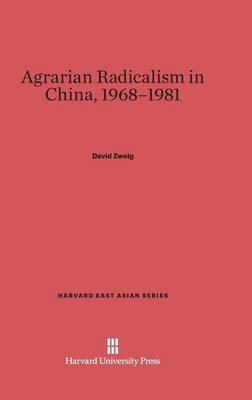Harvard East Asian
1 primary work
Book 102
David Zweig argues that because advocates of agrarian radicalism formed a minority group within China's central leadership, they acted in opposition to the dominant moderate forces and resorted to alternative strategies to mobilize support for their unofficial policies. Zweig examines the local realities of the radicals' program by describing the results of specific policies; he discriminates among the responses of officials at different bureaucratic levels, peasants of varying income levels and family structures, and villages with specific geographic and socioeconomic characteristics. He draws on his own field research in Chinese villages and interviews with Chinese college students and their friends who had lived in the countryside and emigres in Hong Kong who had lived and worked in rural China.
